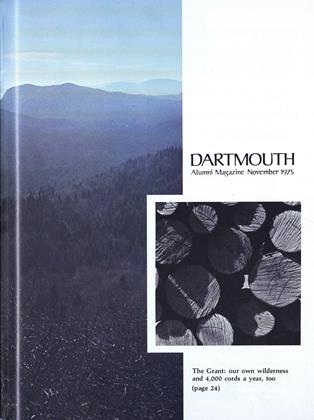It has been a matter of fascination to me to speculate what determines how much of a person's knowledge, capacity for love, wit, and intellectual
attainment appears in his writing or speech. Often one is astonished by the felicity and polish of someone's conversation, only to discover that he has heard all there is to offer. There are writers to whom this applies and others whose published work is not unlike the above-water portion of an iceberg.
There are literary giants whose poems and novels and stories seem to embrace everything they have ever felt or seen, and when this happens, given the talent to match the task, the word genius is not inappropriate. But, more often than not, a writer squints at a few corners of the world he knows and gives them to his audience, eschewing the bear-like embrace of a Tolstoi.
Such a man was Dartmouth's Corey Ford, urbane, generous, and warm; a gourmet, gardener, and outdoorsman; and a graduate of Columbia who lived the last 17 years of his life in Hanover, where many undergraduates enjoyed his generosity.
Ford was a truly professional writer, and his output was substantial - more than 30 books and 300 magazine articles.
An Army Air Force intelligence officer in World War II, Ford found enjoyment and solace in hunting and fishing, and it is perhaps through his monthly "Lower Forty" column in Field and Stream magazine that he became known to most of his readers, certainly to those of the post-war generation, for how many of them remember the delights of the Hotel Algonquin's famous Round Table, the sallies of a Benchley, Woollcott, or Parker? Ford was often with them, and he was one of the first contributors to The New Yorker and continued to write for that magazine until his death, but it was through his "Lower Forty" columns that he became known to middle America, whatever the hell that is.
All of this is by way of leading up to the statement that The Best of Corey Ford would make a splendid addition to one's library, and I should like to quote from my own comments on the book which appeared in The New York Times a short while ago:
"Late last winter in New York City I went to bed with the galley proofs of The Best of CoreyFord, and before I read a dozen pages I was no longer alone, and the drab reaches of Times Square beyond my four walls receded.
"Two hours later, when the book was finished, I scribbled the fallowing on the back of an envelope:
'Once, and it seems a long time ago, I was driving through the flaming October woods on a dirt road to a trout pond hiding in the shadow of a mountain in North Newport, N.H. Near an abandoned farmhouse that fell to earth years before - tenon slipping from mortise as vigor slips from one with age - in a little valley where apple trees lifted their fruit-laden branches above invading pines, I saw a man and a white setter hunting. I knew, as all countrymen know those who range the woods about them, that it was Corey Ford. I knew him only through what he wrote, but that was enough, for what he wrote could make you laugh, tear at your heart make you humble, and perhaps help you find your own Tinkhamtown.
'There is, perhaps, no better example of Ford's writing talents than 'The Road to Tinkhamtown,' the last chapter in the book.
'It is easy - oh, so easy - to make something mawkish of Tinkhamtown's subject but Ford's judgment was exquisite. I wept when I read it, and you may, too.' "
THE BEST OF COREY FORD.Jack Samson, editor. Holt.Rinehart, and Winston, 1975. 266pp., illustrated. $10.
Mr. Bryant is perhaps best known to outdoorsmen and others who cherish the writtenword for his column "Wood, Field & Stream"in The New York Times.
 View Full Issue
View Full Issue
More From This Issue
-
 Feature
FeatureA Delicate Balance
November 1975 By DAN NELSON -
 Feature
FeatureOBESITY
November 1975 By MARy BISHOP ROSS -
 Feature
FeatureFairly Faced
November 1975 By WILLIAM W. COOK -
 Feature
FeatureSome Faults, Some Solid Achievements
November 1975 By M.B.R. -
 Class Notes
Class Notes1923
November 1975 By WALTER C. DODGE, THEODORE R. MINER -
 Class Notes
Class Notes1942
November 1975 By RICHARD W. LIPPMAN, A. JAMES O'MARA










